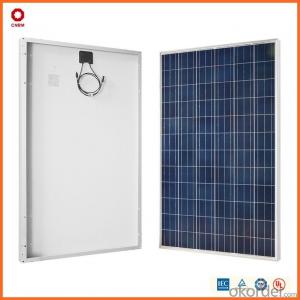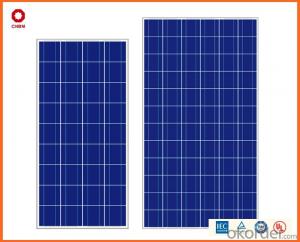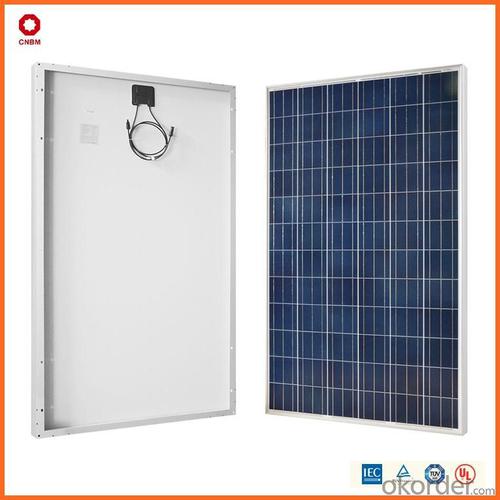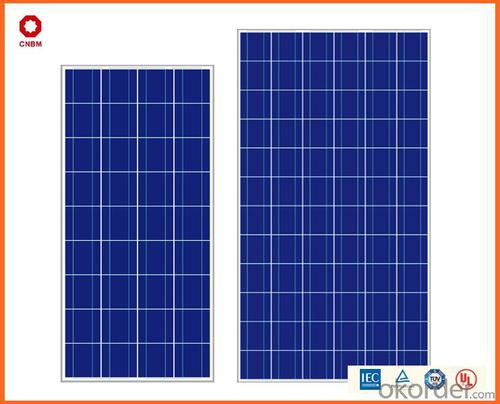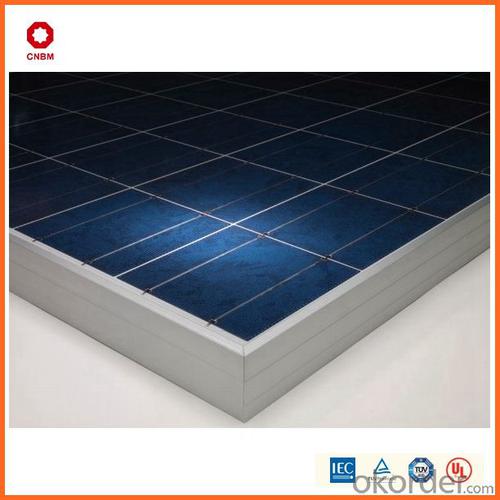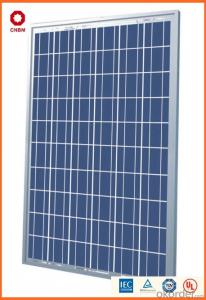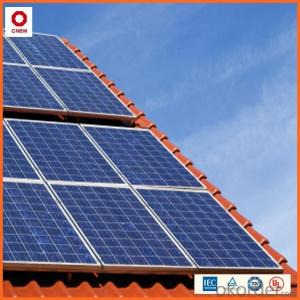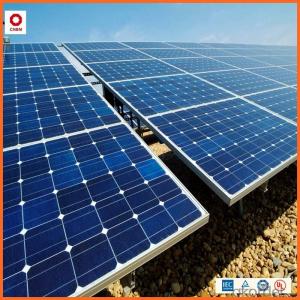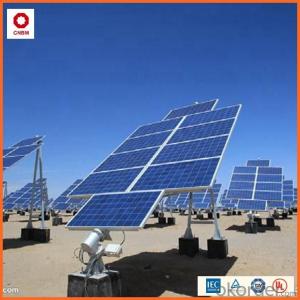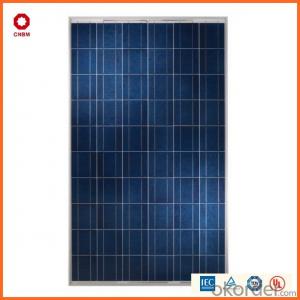Solec Solar Energy Systems - A Grade 255W Poly Solar Panel Hot on Sale at USD0.45/W
- Loading Port:
- China main port
- Payment Terms:
- TT OR LC
- Min Order Qty:
- 1 watt
- Supply Capability:
- 10000000 watt/month
OKorder Service Pledge
OKorder Financial Service
You Might Also Like
Product Description:
Hot Sale !!! Quality and Safety of 245w-320w Poly Solar Panel
1. Rigorous quality control meets the highest international standards.
2. High-transmissivity low-iron tempered glass, strong aluminium frame.
3. Using UV-resistant silicon.
4. IS09001/14001/CE/TUV/UL
Warranties of 245w-320w Poly Solar Panel
1. 10 years limited product warranty
2. 15 years at 90% of the minimal rated power output
3. 25 years at 80% of the minimal rated power output
Technical date of 245w-320w Poly Solar Panel
ITEM NO.: | Mono 125*125 cell ,36pcs . Power range from 80Wp-100Wp | ||||||||
Maximum Power(W) | 80 | 85 | 90 | 95 | 100 | ||||
Optimum Power Voltage(Vmp) | 17.81 | 17.89 | 17.94 | 17.99 | 18.06 | ||||
Optimum Operatige Current(Imp) | 4.78 | 4.91 | 5.12 | 5.35 | 5.59 | ||||
Open Circuit Voltage(Voc) | 21.98 | 22.05 | 22.14 | 22.28 | 22.45 | ||||
Short Circuit Current(Isc) | 4.95 | 5.15 | 5.36 | 5.65 | 5.84 | ||||
Solar Cell: | 125*125 Mono | ||||||||
Number of Cell(pcs) | 4*9 | ||||||||
Brand Name of Solar Cells | JA Cell, Bluesun Cell | ||||||||
Size of Module(mm) | 1580*808*35 | ||||||||
Caple & Connector Type | Pass the TUV Certificate | ||||||||
Frame(Material Corners,etc.) | Aluminium-alloy | ||||||||
Backing (Brand Type) | TPT | ||||||||
Cell Efficiency for 100W(%) | 15.8% | ||||||||
Weight Per Piece(KG) | 12.0KG | ||||||||
FF (%) | 70-76% | ||||||||
Junction Box Type | Pass the TUV Certificate | ||||||||
Tolerance Wattage(e.g.+/-5%) | ±3%, or 0-3% | ||||||||
Front Glass Thikness(mm) | 3.2 | ||||||||
Temperature Coefficients of Isc(%) | +0.04 | ||||||||
Temperature Coefficients of Voc(%) | -0.38 | ||||||||
Temperature Coefficients of Pm(%) | -0.47 | ||||||||
Temperature Coefficients of Im(%) | +0.04 | ||||||||
Temperature Coefficients of Vm(%) | -0.38 | ||||||||
Temperature Range | -40°C to +85°C | ||||||||
Surface Maximum Load Capacity | 2400Pa | ||||||||
Allowable Hail Load | 23m/s ,7.53g | ||||||||
Bypass Diode Rating(A) | 12 | ||||||||
Warranty | 90% of 10 years,80% of 25 years. | ||||||||
Standard Test Conditions | AM1.5 1000W/ 25 +/-2°C | ||||||||
Packing | carton or pallet | ||||||||
1*20' | 25 Pallets / 450pcs | ||||||||
1*40'STD | 25 Pallets / 100pcs | ||||||||
Features of our products:
• High conversion efficiency mono/poly-crystalline amorphous silicon solar cells
• Modules incorporate high performance bypass diodes to minimize the power drop caused by shading
• High transmittance, low-iron tempered glass
• High performance EVA encapsulant to prevent destroying and water.
• AI frame: without screw, corner connection. 8 holes on the frame can be installed easily
• Good performance of preventing from atrocious weather such as wind and hails
• Certifications: CE IEC TUV VDE UL, Class I
• 10 years 90% power output warranty

Shipping of 245w-320w Poly Solar Panel
By Sea | Delivery from Shanghai or Ningbo seaport |
By Air | Departure from Shanghai Pudong Airport |
By Express | Post by DHL, EMS, UPS, TNT. |
- Q: Can a solar energy system be used in areas with high humidity?
- Yes, a solar energy system can be used in areas with high humidity. While it is true that high humidity can affect the performance of a solar energy system to some extent, modern solar panels are designed to withstand various weather conditions, including high humidity. The efficiency of solar panels may decrease slightly in high humidity due to the moisture in the air, but it is not a significant factor that would render solar energy systems ineffective. Additionally, proper maintenance and cleaning of the panels can help mitigate any potential issues caused by humidity. Overall, solar energy systems can still be effectively utilized in areas with high humidity.
- Q: Can solar energy systems be used in powering greenhouses or nurseries?
- Certainly, greenhouses or nurseries can make use of solar energy systems. Solar energy, a source of power that is both renewable and sustainable, can be harnessed by employing solar panels. These panels convert sunlight into electricity, which can then be utilized to power various devices and systems within a greenhouse or nursery. Using solar energy in these environments presents several advantages. Primarily, it helps decrease dependence on non-renewable energy sources like fossil fuels that contribute to greenhouse gas emissions and climate change. By employing solar power, owners of greenhouses and nurseries can significantly lessen their carbon footprint and contribute to a cleaner and more environmentally friendly world. Solar energy systems are also economically efficient in the long term. While the initial installation costs may be higher compared to traditional energy sources, solar panels have a lengthy lifespan and require minimal maintenance. Once installed, they can generate electricity for decades, providing a dependable and consistent power source for the greenhouse or nursery. This can result in substantial energy savings over time, helping to offset the initial investment. Moreover, solar energy systems can be tailored to meet the specific energy demands of greenhouses and nurseries. These facilities often require a steady and trustworthy source of electricity for various functions, such as lighting, heating, ventilation, and irrigation systems. Solar panels can be positioned in a manner that maximizes energy production and ensures a continuous supply of power throughout the day, even during periods of low sunlight. In addition to powering the facility, solar energy systems can also store excess electricity in batteries. This stored energy can be utilized during overcast days or at night when sunlight is not available, ensuring an uninterrupted power supply to the greenhouse or nursery. All in all, solar energy systems offer a feasible and sustainable solution for powering greenhouses and nurseries. They provide environmental benefits, cost savings, and a reliable source of electricity, making them an appealing choice for those in the agricultural industry.
- Q: Solar PV systems
- Article 1 in order to regulate the construction of distributed photovoltaic power generation project management, promote distributed photovoltaic applications, according to the "People's Republic of China renewable energy law", "People's Republic of China, People's Republic of China" power law "administrative licensing law", and the "State Council on a number of opinions" to promote the healthy development of the PV industry, these measures are formulated.
- Q: Can solar energy systems be used in areas prone to hurricanes or typhoons?
- Solar energy systems can indeed be utilized in regions susceptible to hurricanes or typhoons. Although severe weather conditions like these can pose a threat to solar panels, contemporary solar energy systems are specifically engineered to endure such circumstances. Typically, solar panels are constructed to withstand strong winds and hail, undergoing rigorous testing and certification to meet specific wind resistance standards. These panels are securely mounted and firmly anchored to roofs or the ground, effectively preventing them from being lifted or blown away during powerful winds. Manufacturers additionally conduct extensive tests to verify the panels' ability to endure extreme conditions, including those encountered during hurricanes or typhoons. In areas prone to hurricanes or typhoons, it is common to have building codes and regulations that necessitate solar installations to meet precise wind load requirements. These requirements ensure that the solar energy systems can withstand the forceful winds associated with such storms. Moreover, inverters and other components of solar energy systems are often situated in protected areas, such as basements or garages, in order to minimize the potential for damage from flooding or flying debris. Stringent installation practices, including reinforced mounting systems and proper grounding, can further augment the durability and resilience of solar energy systems in hurricane or typhoon-prone areas. It is important to acknowledge that while solar energy systems can endure severe weather events to a certain degree, there is always a risk of damage during exceptionally powerful hurricanes or typhoons. However, this risk is not exclusive to solar energy systems and applies to other forms of infrastructure as well. By adhering to proper design, installation, and compliance with local building codes, this risk can be minimized, ensuring the secure and dependable operation of solar energy systems in hurricane or typhoon-prone areas.
- Q: Can solar energy systems be used in areas with limited access to food?
- Yes, solar energy systems can be used in areas with limited access to food. Solar energy systems can power various agricultural technologies such as irrigation systems, greenhouses, and hydroponic systems, which can help improve food production in these areas. Additionally, solar energy can also be used to power refrigeration and storage systems, allowing for better preservation of food and reducing post-harvest losses.
- Q: Can solar energy systems be used in areas with limited access to solar energy publications and resources?
- Yes, solar energy systems can still be used in areas with limited access to solar energy publications and resources. While access to information and resources can be helpful in understanding and maximizing the benefits of solar energy, it is not a prerequisite for utilizing solar energy systems. Basic knowledge of solar energy, combined with the availability of solar panels and equipment, can still enable individuals and communities to harness solar power for their energy needs. Additionally, local organizations, government initiatives, and international assistance programs can play a vital role in providing support and knowledge transfer to these areas, helping them overcome the limitations of accessing solar energy publications and resources.
- Q: Can solar energy systems be used for transportation purposes?
- Yes, solar energy systems can be used for transportation purposes. Solar-powered vehicles, such as solar cars, boats, and even airplanes, have been developed and are capable of utilizing the sun's energy to generate power for propulsion. Additionally, solar energy can be used to charge electric vehicles, extending their driving range and reducing the reliance on fossil fuels.
- Q: Can solar energy systems be used in areas with limited sunlight hours?
- Solar energy systems can indeed be utilized in regions with minimal sunlight hours. Although solar panels generate the highest amount of energy when directly exposed to sunlight, advancements in technology have made it feasible for solar systems to still produce electricity even in areas with limited sunlight. One method to tackle the issue of limited sunlight hours is by installing solar panels that are more efficient at capturing and converting sunlight into electricity. These high-efficiency solar panels can optimize energy production even in areas with reduced sunlight. Additionally, the utilization of tracking systems that tilt and follow the sun's path throughout the day can also aid in increasing energy output. Another approach involves storing excess energy generated during peak sunlight hours in batteries. This stored energy can then be utilized during periods of low sunlight, enabling the solar system to continue powering homes or businesses even in the absence of sunlight. Furthermore, integrating solar power with other renewable energy sources, such as wind or hydroelectric power, can help compensate for limited sunlight hours. By combining different sources, a more reliable and consistent energy supply can be achieved. In conclusion, although limited sunlight may impact the energy production of solar systems, there are numerous technological solutions and strategies that can be employed to make solar energy feasible even in areas with fewer sunlight hours.
- Q: Can a solar energy system be installed on a commercial parking lot?
- Yes, a solar energy system can be installed on a commercial parking lot. In fact, commercial parking lots offer a great opportunity for solar panel installation due to their large, open spaces that receive ample sunlight. Solar panels can be installed on the parking lot's canopies or on elevated structures, such as carports, which provide shade for parked vehicles while generating clean and renewable energy. This not only helps to reduce the carbon footprint of the commercial establishment, but it also provides additional benefits such as shaded parking spaces and potential revenue from excess energy generated that can be sold back to the grid. Additionally, installing a solar energy system on a commercial parking lot can help to promote sustainability and environmental consciousness among customers and employees, making it a win-win solution for both businesses and the environment.
- Q: Can solar energy systems be used in powering government buildings or offices?
- Yes, solar energy systems can be used to power government buildings or offices. In fact, many government buildings around the world have already adopted solar energy systems as a means of reducing their carbon footprint and dependence on traditional energy sources. Solar panels can be installed on rooftops or in open spaces adjacent to government buildings, harnessing sunlight to generate electricity that can be used to power various activities within the buildings. This sustainable approach not only helps in reducing greenhouse gas emissions but also saves money on energy bills in the long run.
Send your message to us
Solec Solar Energy Systems - A Grade 255W Poly Solar Panel Hot on Sale at USD0.45/W
- Loading Port:
- China main port
- Payment Terms:
- TT OR LC
- Min Order Qty:
- 1 watt
- Supply Capability:
- 10000000 watt/month
OKorder Service Pledge
OKorder Financial Service
Similar products
Hot products
Hot Searches
Related keywords
